Playa3ull Games Review 2024: Next-Generation Web3 Gaming Platform!
I think it is fair to say that most of us in the crypto industry are extremely bullish on crypto games. Blockchain gaming and play-to-earn games absolutely exploded in 2021, reaching heights that took everyone by surprise.
But, let’s not fool ourselves. The early days of crypto games were “meh” at best, but like everything in the tech and gaming world, developments and advancements in the space are increasing at breakneck speeds!
Look no further than the short time that passed between games like CryptoKitties and Axie Infinity, to next-gen striking games like Star Atlas and Big Time. The jump from CryptoKitties to the playable mini-games of Star Atas is comparable to the jump from the original Mario for Nintendo to Call of Duty, but instead of the 34 years it took to go from the little red hat plumber jumping on turtles to Call of Duty: Modern Warfare, we went from Axie Infinity to Triple-A Blockchain titles in less than five. Talk about a shining example of the gaming version of Moore’s Law!
Many of us believe that Web3 games could be the catalyst that brings the next billion users into crypto. After all, an estimated 3.9 billion people on the planet are considered gamers, a small fraction of those are active crypto gamers. This is where platforms like Playa3ull games are doing their part to bridge the chasm between traditional and Web3 games.
And if their platform is as clever as the wordplay in their name — being a fusion of 'playable,' 'playabull,' for bullish and the '3' for Web3 — there may be something worth unpacking here, so let’s dive into this Playa3ull Games review!
Introduction to Playa3ull Games
Gaming history lesson first!
Ancient civilizations passed time by playing board games. However, the latter half of the 20th century is when things kicked into high gear with the rise of digital technology.
The earliest electronic games were a simple affair. Often pixelated, these games represented classic board games like chess and checkers. As technology advanced, video game consoles emerged, bringing interactive and visually engaging experiences into the comfort of our homes. Then came the arcade era, which served to further fuel the popularity of gaming, with iconic titles like Pac-Man and Space Invaders.
Personal computers in the 1980s marked a significant milestone, allowing for more complex and diverse gaming experiences. The true revolution, however, came with the rise of online gaming platforms. As the internet broke down geographical barriers and allowed players to engage with each other, physical distance became inconsequential. The emergence of online gaming platforms revolutionized multiplayer experiences and gave rise to esports — competitive gaming at a professional level with millions of dollars in prize pools.
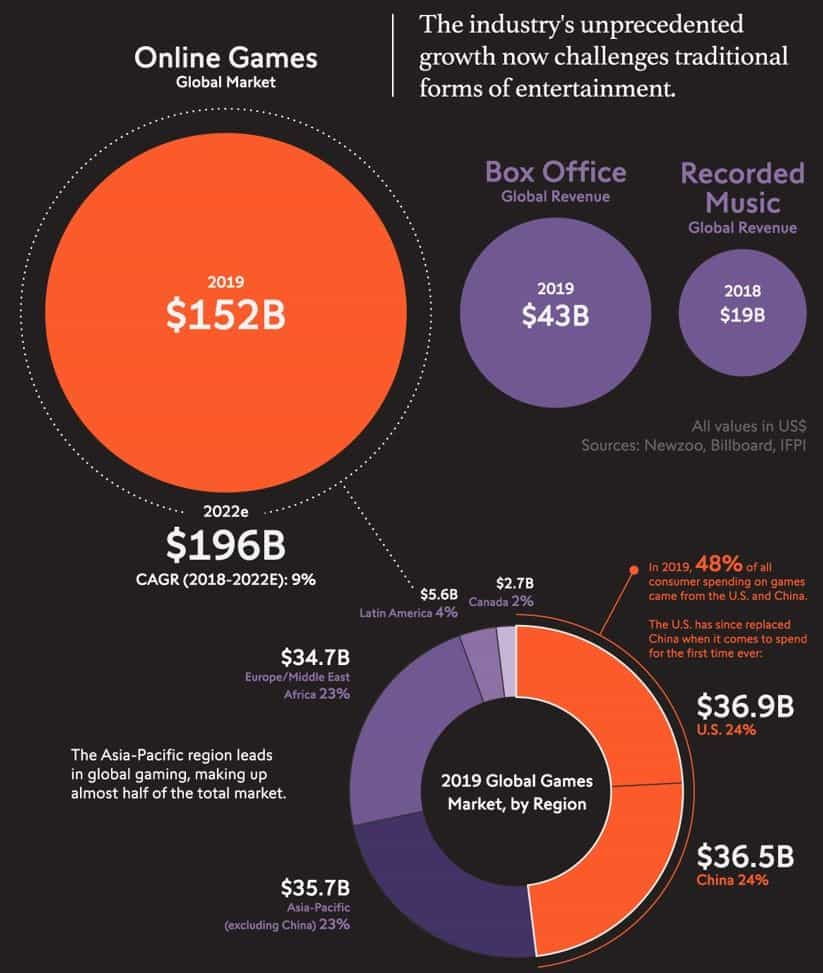
In recent years, the integration of virtual reality (VR) has taken gaming to unprecedented levels of immersion. With VR technology, you can simply put on a headset and experience the game world in 3D with a sense of presence.
This evolution of gaming — from traditional board games to the immersive experiences of VR — is now intersecting with blockchain and cryptocurrencies. These games leverage blockchain technology to introduce unique features that enhance player ownership and the creation of digital assets.
Playa3ull exemplifies the innovative strides being made in the crypto games industry.
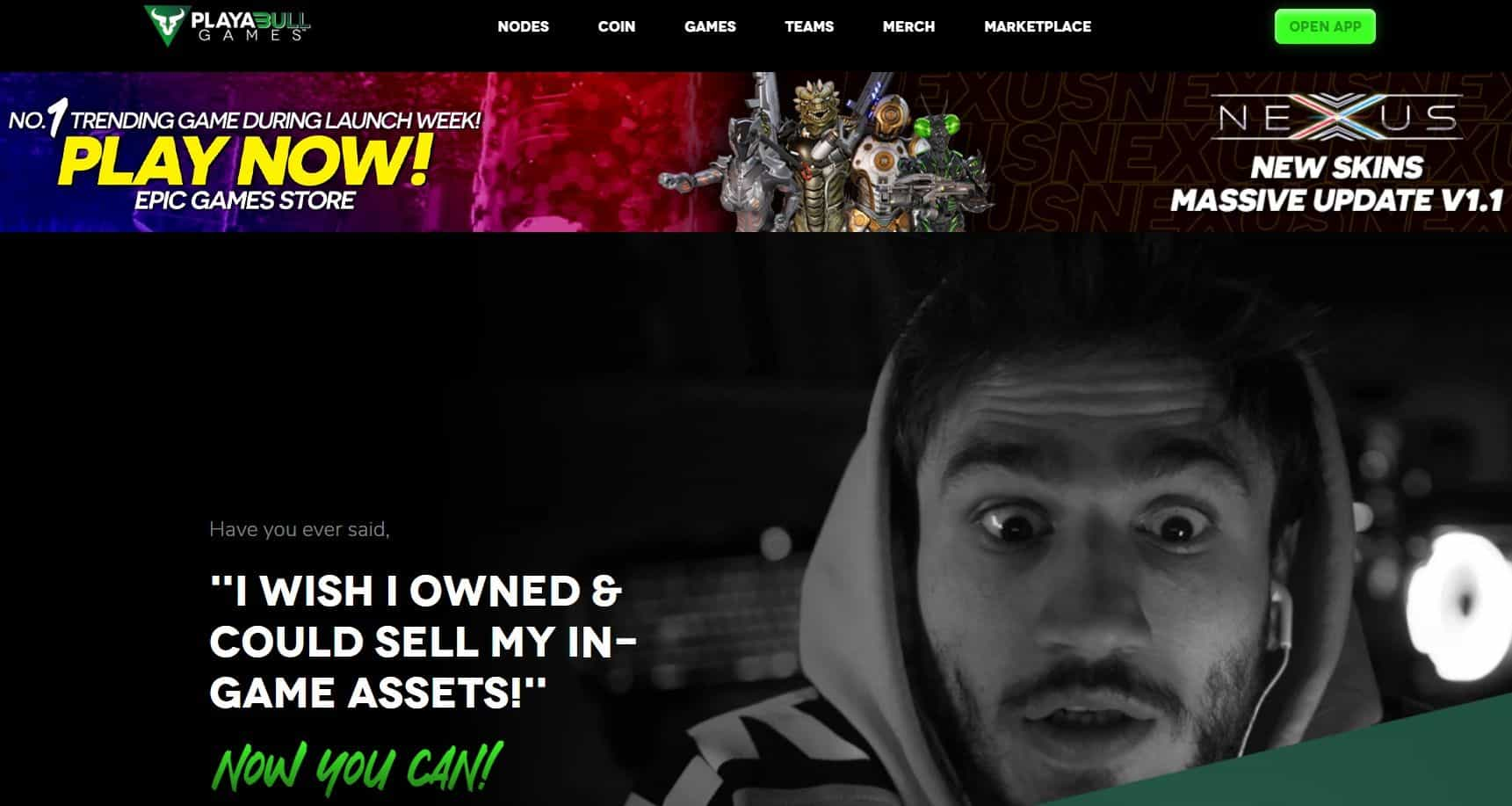
With a vision to innovate both internally developed games and externally sponsored projects, Playa3ull has crafted its own blockchain and introduced the 3ULL Coin as the backbone of its ecosystem.
Who founded Playa3ull Games?
The whitepaper lists Jonathan Bouzanquet as the founder, and Playa3ull isn't his first rodeo.
In November 2015, Bouzanquet co-founded a boat-sharing company, but the start-up had to be shut down two years later when the Australian federal government made boat-sharing illegal. That's when Bouzanquet landed in the gaming industry. In April 2021, he joined the Australian game development studio Melbourne Interactive, where Bouzanquet helped raise US$8000,000 to fund a new first-person shooter the studio was working on. Then, he joined Branda3ULL Marketing as chief marketing officer. The company integrated blockchain technology in mid-2021. Later that year, he founded Playa3ull Games, where he currently serves as chief strategy officer.
Jethro Bouzanquet, Samuel Bouzanquet and Amanda Bouzanquet are the co-founders of Playa3ull Games.
Building the Future of Gaming
What makes a game great? It's a seemingly straightforward question at first glance but inherently subjective. For me, it's the harmony of code and creativity — a story that brings intrigue and emotion, visuals that transcend aesthetics, pacing with moments of stillness and a sudden thrust into action, interactivity where my choices have consequences and music that's more than a background melody.

But as we marvel at traditional gaming greatness, Web3 games unleash unprecedented possibilities thanks to some blockchain magic.
Blockchain games introduce a layer of ownership and scarcity through non-fungible tokens (NFTs). Each in-game asset becomes a unique digital item that players truly own and not the studio as is the case in traditional games. As a result, these games transcend the screen, becoming a story not just of characters and quests but of tangible assets that hold real-world value.
According to Playa3ull, a great game should have six pillars.
- Immersive Experience: Playa3ull emphasizes the importance of immersion, recognizing that a great game should transcend the mere act of playing and fully engage the player in a captivating world.
- Highest Standard of Quality: This principle implies a dedication to delivering polished, well-crafted games that meet or exceed industry standards in terms of graphics, mechanics, and overall player experience.
- Player Role: Playa3ull recognizes the importance of player input in game development. By suggesting that players should have an advisory role, the vision promotes a collaborative relationship between developers and the gaming community.
- Ownership of In-Game Assets: Thanks to blockchain technology, players gain true ownership of virtual items along with the ability to buy, sell, or trade these assets outside of the game's digital world for money.
- DAO Involvement: Playa3ull envisions each game being advised by a DAO, emphasizing decentralization and community governance. This principle suggests that decisions related to game development, updates, and community management should be driven by an independent, decentralized entity.
- Rewards for Loyalty and Time: By recognizing and rewarding player commitment, whether through in-game achievements, participation, or other loyalty programs, this final pillar encourages a reciprocal relationship between players and developers.
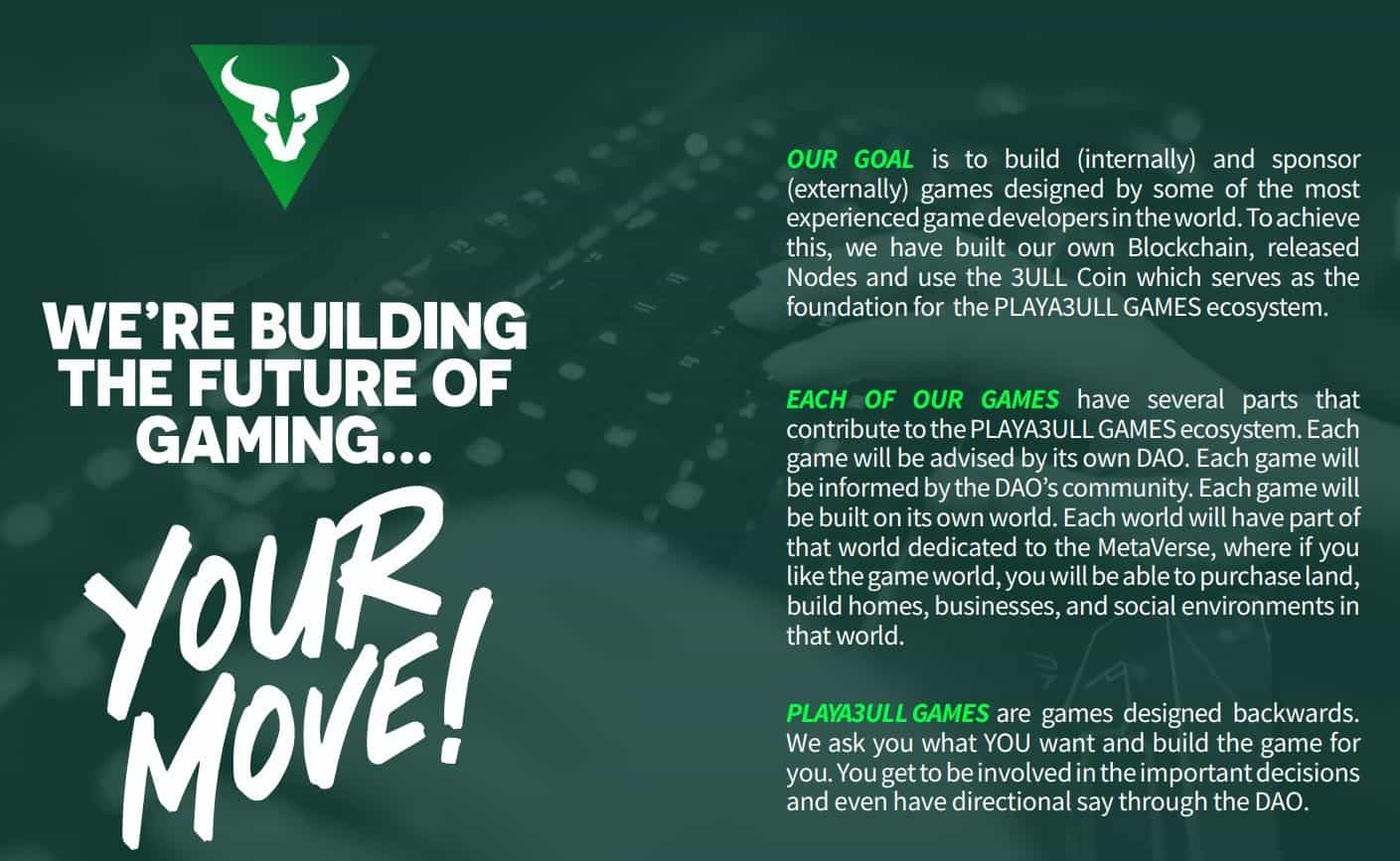
In its whitepaper, Playa3ull articulates a vision aimed at revolutionizing the gaming experience through player engagement, decentralized decision-making, and the integration of its native cryptocurrency, 3ULL.
The company's goal revolves around both internal game development and external game sponsorship. By leveraging its blockchain, Playa3ull establishes the foundation for the Playa3ull Games ecosystem, where the 3ULL coin plays a central role. This cryptocurrency serves as the medium for transactions within the ecosystem, enabling secure and transparent in-game exchanges.
But perhaps what sets Playa3ull apart is its unique methodology where games are "designed backwards." Instead of dictating the gaming experience to the players (as has been the case always), Playa3ull actively involves the community in decision-making processes. Through the decentralized autonomous organization (DAO), players have a direct say in the development and evolution of the gaming world.
Incorporating the metaverse within Playa3ull's games introduces a still-new dimension, allowing players to purchase virtual land, build homes, businesses, and social environments. This should not only enhance player engagement but also introduce economic opportunities within the virtual worlds.
Overview of Playa3ull's Offerings
In this section, we'll explore Playa3ull's offerings, exploring its commitment to player involvement and the integration of cryptocurrency.
3ull Blockchain
As noted, the 3ull Blockchain is built on an Avalanche Subnet for a number of reasons.
- This integration, Playa3ull says, brings forth enhanced scalability and unparalleled speed, allowing it to manage extensive transaction volumes and ensuring a smooth gaming experience for players.
- Leveraging Avalanche's security protocols guarantees the utmost protection for the community's in-game assets and personal data.
- The cost-efficient deployment of the Avalanche Subnet results in reduced transaction fees, enhancing accessibility for gamers.
3ull Coin
The 3ULL coin is built on Avalanche Subnet technology and it powers the Playa3ull ecosystem.
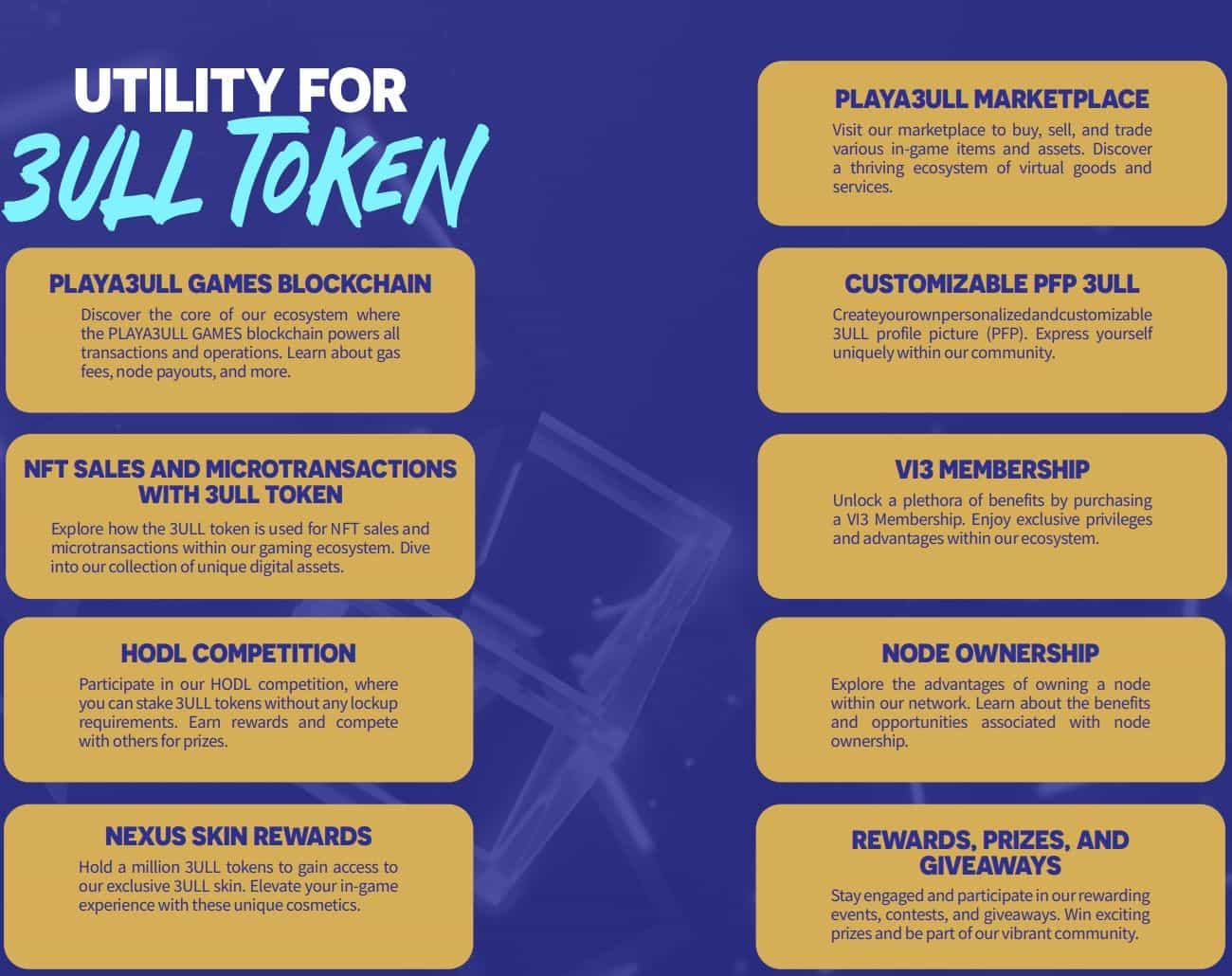
Playa3bull has introduced a 10% burn mechanism for 3ULL. The purpose of this mechanism is to enhance the deflationary nature of the coin, ensuring that its supply decreases over time. The intentional burning of a portion of the coin with each transaction helps promote a continuous reduction in the total supply, which increases the coin's scarcity.
3ULL Coins Tokenomics
The total maximum supply is set at 50 billion, with the issuance planned over a span of 10 years. A total of 5 billion 3ULL coins will come into existence each year for the next 10 years. This annual issuance is facilitated through nodes, which we'll explore in the next section.
The network issues 13,698,630 3ULL coins daily, with 50% evenly distributed between node owners and the remaining 50% allocated to the company for operational purposes. Playa3bull utilizes its share to sustain overall operations, acquire games, and facilitate ongoing game development initiatives. As the quantity of nodes grows, the number of coins allocated to individual node owners diminishes proportionally.
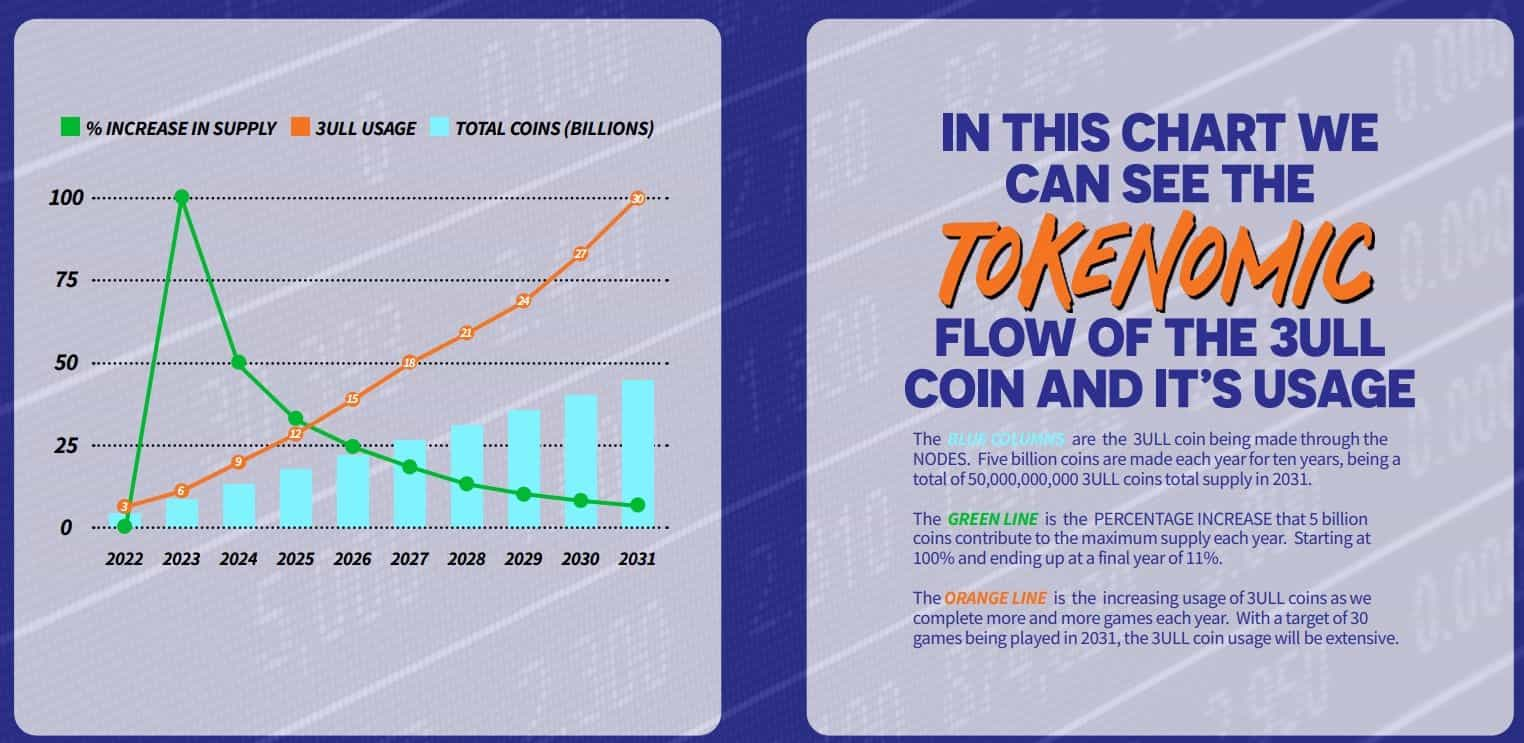
After the complete distribution of all coins, node owners are remunerated with a modest fee for each transaction in recognition of their role in hosting the nodes. This methodology guarantees the network's self-sufficiency beyond the initial coin distribution phase. The fees generated from blockchain transactions are currently being saved with the intention to extend the 3ULL rewards once the entire coin supply has been minted.
Today, 3ull is trading hands at $0.0076, an impressive increase from its public launch price. Token performance is also looking quite resilient to the current adversities faced in the crypto industry with the current price representing a modest decline of about 14% from its all-high price, which it hit on Nov. 23, 2023.
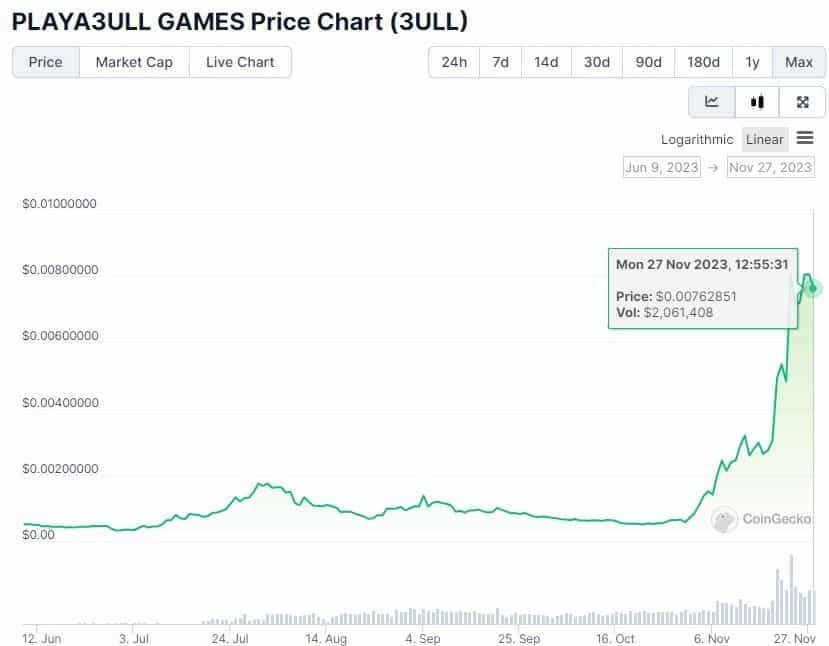
If you're looking to get your hands on Playa3ull's native token, you can buy it through MEXC, BitMart or swap for it on Trader Joe. Considering another coin? Check out how exchanges fare in our article on the best crypto exchanges.
Playa3ull Nodes
At the core of the Playa3ull ecosystem lies the Master Node Network, serving as a vital element for decentralized blockchain indexing, querying, and IPFS storage.
- Decentralized Blockchain Indexing: Master nodes play a crucial role in overseeing and managing the blockchain ledger, ensuring the indexing of all transactions. This functionality is instrumental in maintaining an accurate record of every transaction and data stored on the blockchain.
- Blockchain Querying: Master nodes empower rapid and efficient querying of the blockchain, allowing seamless interaction for games and users. This capability enables the execution of transactions and access to data at high speeds, contributing to a fluid and responsive gaming experience.
- IPFS Storage: Master nodes serve as providers of InterPlanetary File System (IPFS) storage, constituting a peer-to-peer decentralized network. This infrastructure is primarily dedicated to storing NFT metadata and image data, ensuring secure and distributed storage. The utilization of IPFS guarantees reliable access to vital digital assets within the ecosystem.
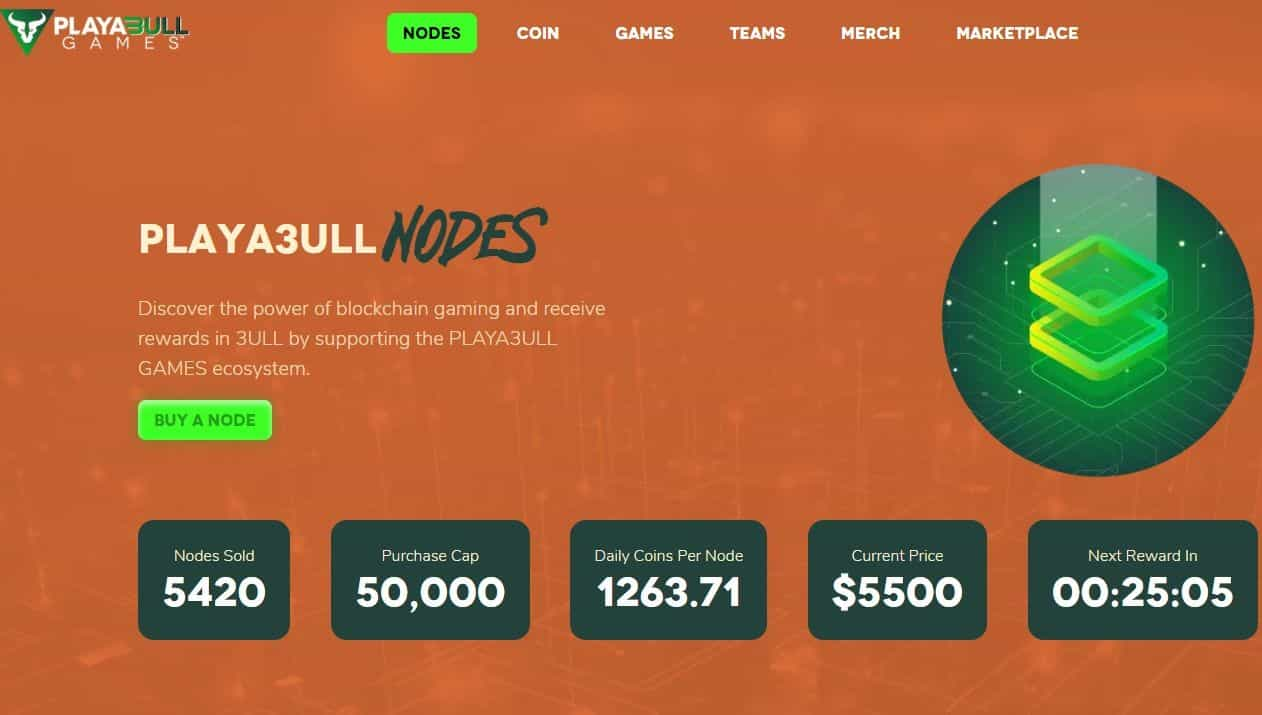
Nodes were priced at $100 each for the first 100. The price will continue to increase by $100 after every 100 nodes are sold. Currently, one node is going for $5,500 and Playa3ull has thus far sold over 5,400 nodes.
Acquiring a Playa3ull Master Node entails obtaining a license for operational privileges rather than purchasing dedicated hardware. The activation process comprises three stages. During the initial phases, you will need to furnish the necessary computer hardware for running the Playa3ull Master Node. It is essential to note that dedicated hardware meeting specific requirements, such as 2 CPU cores, 4 GB RAM, 100 GB storage, and a reliable internet connection, will only be mandated in the third and final stage of Master Node activation.
Even though node owners are rewarded in 3ULL, nodes should not be considered an investment, the company says.
Playa3ull Metaverse
The metaverse is considered the next frontier of gaming. In its final form, the metaverse is a fusion of virtual and augmented reality, boasting an independent functioning economy and complete interoperability.
While achieving this ambitious vision may be a distant horizon, we've already caught glimpses here and there. Platforms like Roblox exemplify metaverse elements, featuring luxury fashion brands such as Gucci hosting events. Games like Fortnite allow users to attend virtual concerts, and Facebook literally changed its name to Meta and bought a VR headset company so it could advance its vision.
The interest in constructing the metaverse is evident in the increasing number of companies venturing into this space, with approximately 500 organizations identified by market researcher Newzoo as actively contributing to sectors dedicated to the digital world.
In 2024, Playa3ull plans to launch its metaverse where it will be selling land not dissimilar to metaverse projects like Decentraland and The Sandbox.
Very Important 3ulls (VI3)
At the heart of every organization are its ardent believers — individuals deeply passionate about the company's pursuits and eager to be active contributors. Within Playa3ull Games, this dedicated community is known as our VI3s (Very Important 3ULLs). Membership in this exclusive club requires an investment of 10,000 3ULL coins ($762.8 currently).
Benefits include a special private channel in Discord, early access to everything and an opportunity to be involved in surveys that influence the company's strategic direction, among other things.
Exploring the Playa3ull Game Library
The Playa3ull game library currently lists five titles, but there's only one game playable right now. As a reminder, the company is aiming for 30 titles by 2031.
Nexus
Nexus is a third-person multiplayer shooter where you can construct your personalized character by crafting a diverse array of weapons, abilities, and equipment.
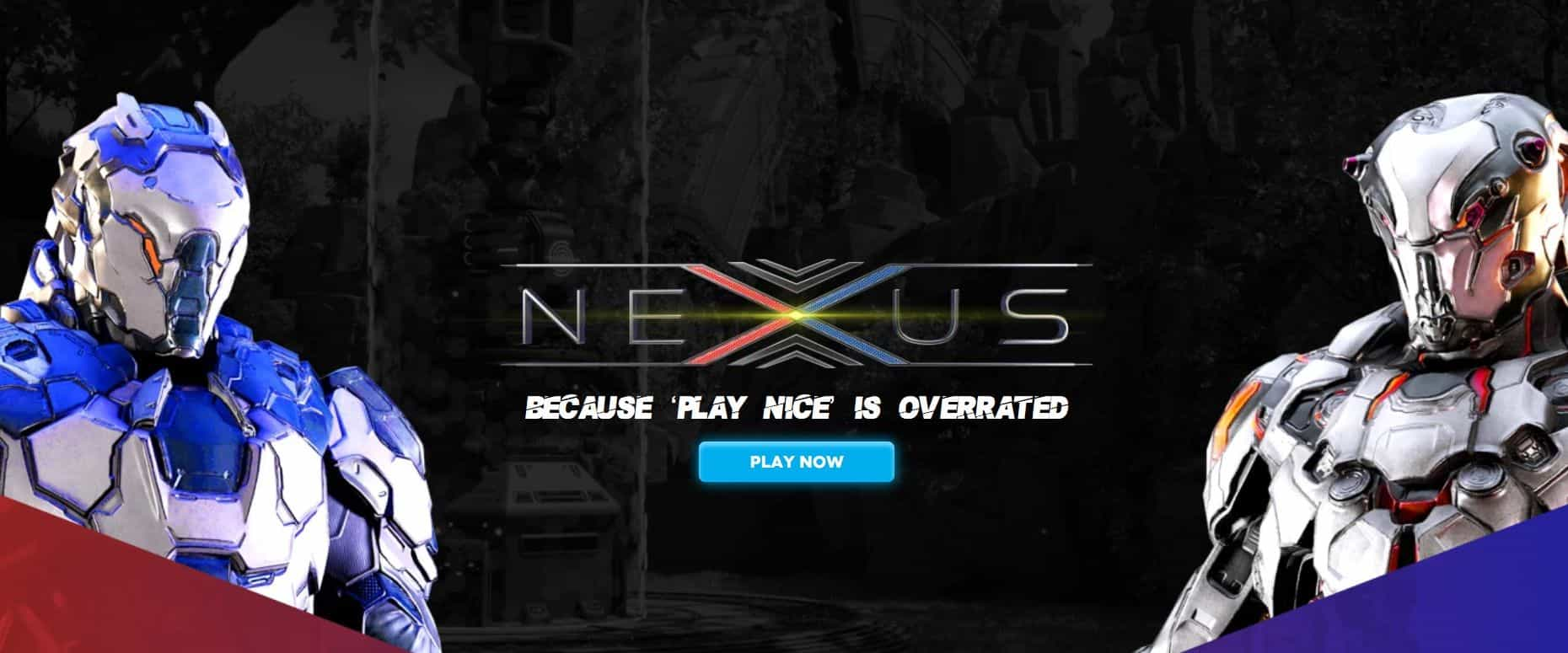
The game, powered by Unreal Engine 5, puts you in 5v5 battles. You can equip and swap abilities in your loadout. Notably, to the relief of many in the the gaming community, Nexus doesn't have any pay-to-win elements.
The gameplay is undoubtedly fun, and for the most part, it's polished. Interestingly, the game starts you off with a little money so you can upgrade your gear. Pro tip: It's best to get your hands on a Level 3 weapon as soon you can so you can obliterate the competition.
Once you're taken out by the opposing team, you'll respawn in 23 seconds. Die a second time, and you'll be back in action in 27 seconds.
War of Steel
This is a battle royale game (like Fortnite) that's designed for swift, action-packed encounters.
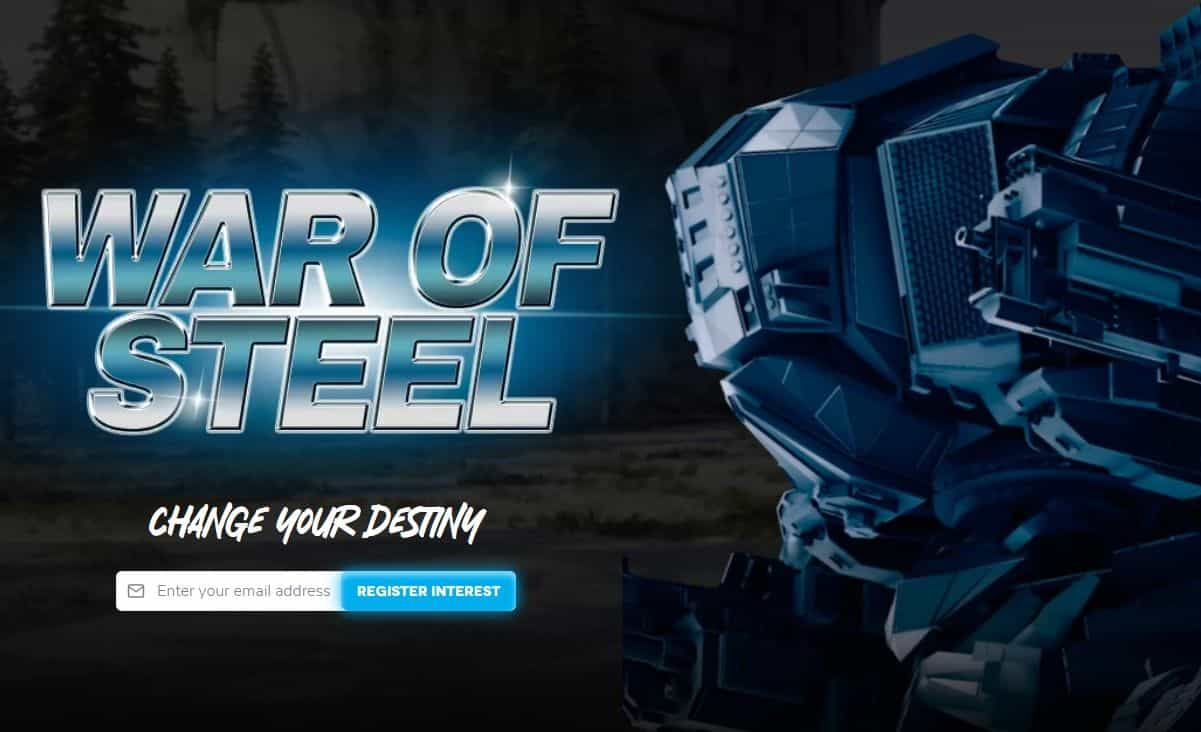
Most games will clock in under 30 minutes. Upon entering battle, you'll select one of three Mechs — Tank, Marauder or Recon Rogue — each boasting unique abilities. War of Steel hasn't yet been released and no release date has been given either.
Dogs of War
In this survival game, your character is a fusion of canine and human DNA.

Drawing inspiration from titles like DayZ and Rust, Dogs of War blends survival against the elements and intense player-versus-player conflicts into a fast-paced gaming experience. Players can collect NFTs and trade them on the Playa3ull Games marketplace to enhance their 3ULL holdings. The game also presents opportunities to earn 3ULL through regular competitions and NFT trades.
Dogs of War doesn't have a release date yet.
Starvin Martian
Embark on an extraterrestrial journey!
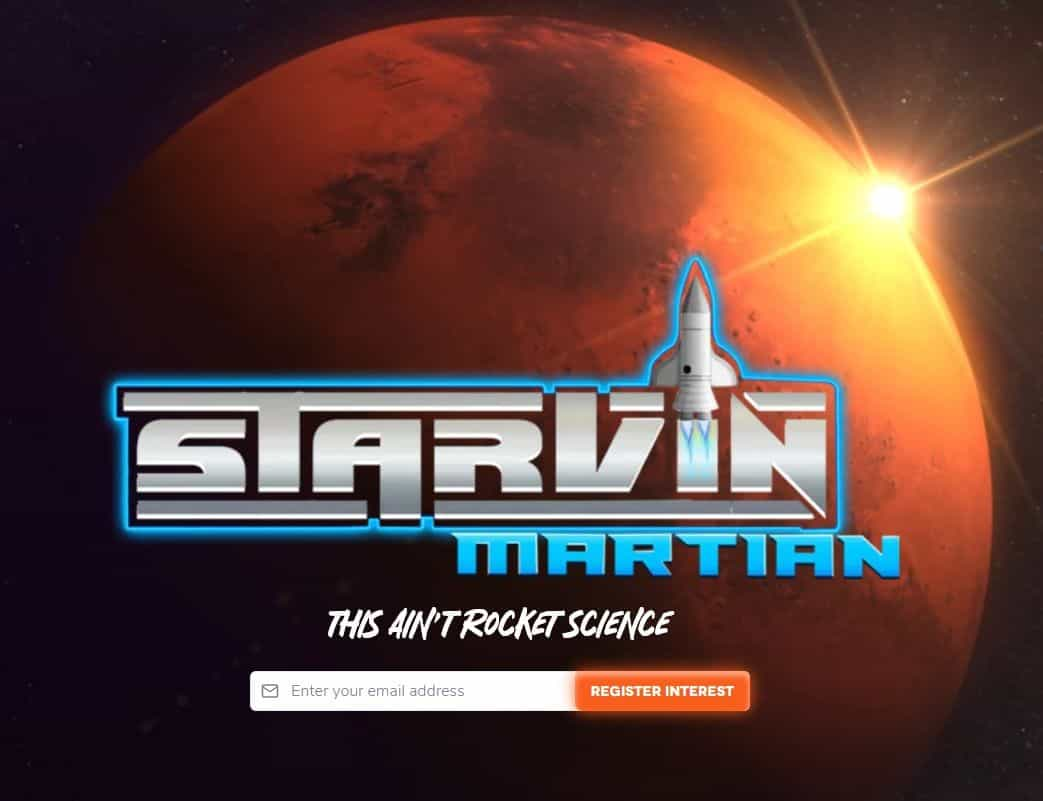
This farming-style game unfolds on the crimson landscapes of Mars. Players will carve out their lives on the red planet through resourcefulness and savvy decision-making.
The game, when released, will allow you to own your assets through NFTs. You can also engage in competitions that challenge your strategic prowess in building and managing your farm, with the most adept players earning rewards in the form of 3ULL coins.
Ordinem
Ordinem is a trading card game that draws inspiration from card games like Magic: The Gathering and Hearthstone.
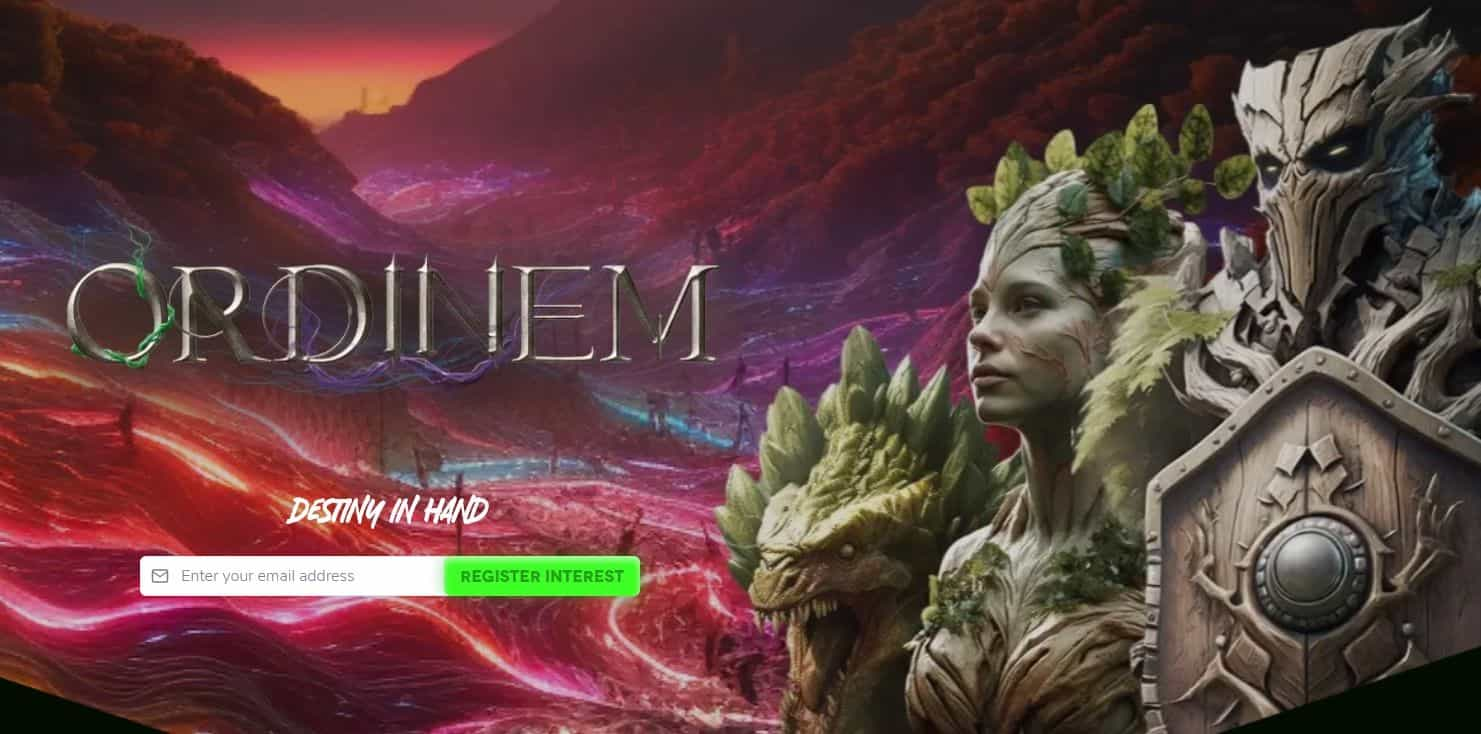
Within the game, players harness the mystical forces of the five distinct “orders” of magic to cast potent spells, summon loyal followers, forge magical artefacts, and weave powerful enchantments, all with the aim of triumphing over their adversaries.
You'll commence your Ordinem journey with base decks featuring complimentary cards, providing a foundation for your magical exploits. The path to mastery unfolds through gameplay and victories. Players can enhance their decks by acquiring card packs on the Playa3ull Games marketplace, using the 3ULL coin as their currency.
Ordinem doesn't have a release date yet either.
Community and Social Aspects
Gaming extends beyond pixels and code, and journalist/novelist Keith Stuart likened it to communal space more akin to a skate park than a competitive arena. The gaming experiences thrive via its community and shared experiences.
Playa3ull's Discord stands as a hub where like-minded individuals converge, bonded by a common passion for blockchain gaming. The company's Discord has over 12,000 members, and there were over a thousand online at the time of writing. In addition to Discord, Playa3ull also has a presence on:
Monetization, In-Game Purchases and NFTs
Just as games have improved, monetization strategies have evolved beyond traditional models too, injecting in-game purchases and NFTs (blockchain games only) into the mix.
Streaming and Monetization
Game streaming platforms like Twitch, YouTube Gaming and Facebook Gaming have turned gamers into live entertainers, broadcasting their gameplay to a global audience. Viewers on these platforms interact with streamers through live chats, donations and subscriptions.
Twitch is by far the largest game-streaming platform. In October 2023, Twitch viewers spent 1.8 million hours consuming content and the website logged 6.9 million active streamers, according to TwitchTracker.
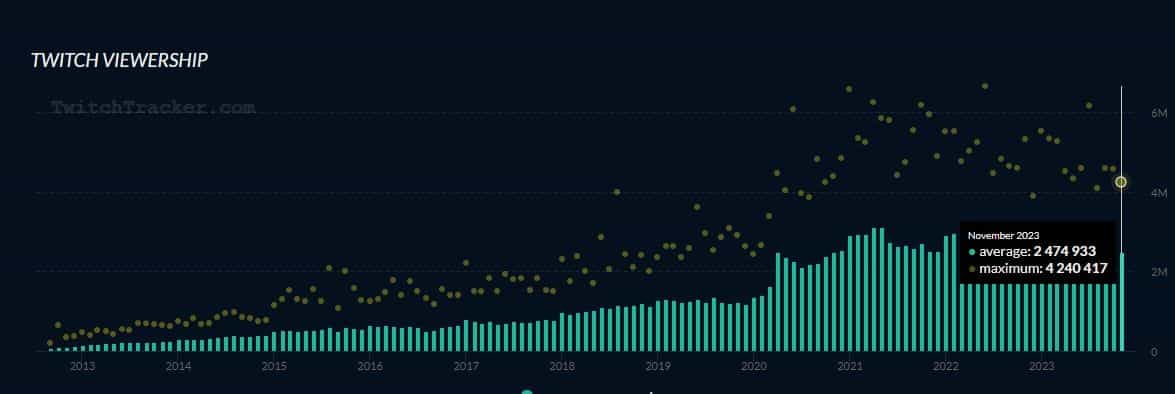
This passive consumption of gaming content has given rise to a gaming-centric content creation economy, which extends beyond streaming platforms. YouTube, for example, has given rise to a diverse array of gaming content, from tutorials to reviews. Stuck in an in-game puzzle? Turn to YouTube. Looking to learn a new mechanic in Rocket League? You bet it's on YouTube. Those reviewing games wield significant impact to the point where what they say can influence purchasing decisions.
Streaming games and creating game-centric content can extend to cryptocurrency games as well. Who knows? Maybe we'll have a blockchain game-focused streaming platform too.
Today, monetization in gaming extends far beyond the initial purchase price. Games often adopt “freemium” models, allowing players to access the core experience for free while offering optional in-game purchases that enhance gameplay or provide cosmetic upgrades.
In crypto gaming, the currency (3ull, in this case) plays a vital role too. This is because everything in the game is powered by the game's native token, and players have to spend fiat money in order to get the coin.
In-Game Purchases
In-game purchases, or microtransactions, are the bane of most gamers' existence. However, they've fast become an indispensable tool for gaming companies as a means to generate revenue. Globally, microtransactions are expected to pull in an eye-popping $76.66 billion in 2023, according to The Business Research Company.
Microtransactions range from cosmetic items like a new shiny gun skin and outfits to more substantial additions such as expansion packs and characters. Players willingly spend money on these items to elevate their gaming experience. This gives developers the incentive to continually introduce fresh content to sustain player engagement.
These in-game purchases are a consistent source of revenue for gamer makers, ensuring they continue to generate cash long after someone has purchased the game. The money often supports ongoing game development, allowing developers to roll out regular updates and expansions that keep players hooked over the long term.
NFTs
NFTs are front and centre in blockchain technology's fusion with gaming, which has changed the way ownership of in-game assets is perceived.
In general, NFTs are unique, indivisible tokens that represent ownership of a specific digital asset. Perhaps you've heard of digital pictures being sold for millions of dollars? (The most expensive one was sold for $69.3 million) In the context of gaming, however, NFTs are used to tokenize in-game items, characters and other possessions in the digital world.
Players can buy, sell, and trade these NFTs both within and outside the game environment for fiat money.
Balancing Fair Play and Revenue
The thrill of victory, brought to you by the magic of the credit card!
Picture this: You, a seasoned warrior, have honed your skills in a game through hours of grinding. But wait, here comes Mr. Deep Pockets, armed with a shiny, purchased legendary sword and a character so powerful it's practically a cheat code. You strategize, you dodge, you aim for precision, and then BAM! They unleash their mega-ultra-deluxe laser cannon of doom that they acquired with a simple transaction. How can anyone compete with that?
Spoiler alert: you can't.
Monetization is a tough cookie to crack for developers. On one hand, they have to meet their revenue goals, and on the other, they have to ensure that their game provides a level playing field for both paying and non-paying players.
Striking this balance involves transparent communication with the player community about monetization methods and a commitment to avoiding predatory practices.
Predatory monetization schemes in video games are purchasing systems that disguise or withhold the long-term cost of the activity until players are already financially and psychologically committed. Such schemes contribute to the increasing similarity of gaming and gambling and the potential for financial harm for those with Internet gaming disorder. - Wiley
One example of these predatory practices is the introduction of loot boxes in video games, which can be compared to a randomized vending machine or a gambling slot machine in Las Vegas. You can put money up to your heart's content in these loot boxes, yet there's an extremely low probability of obtaining the desired item. As a result, players find themselves in a vicious cycle — continue to pour money into loot boxes in a bid to obtain the item they're looking to get their hands on.
In 2022, Lim Cheng Mong found himself in $20,000 in credit card debt. Turns out, his 18-year-old daughter spent the money on Genshin Impact, which employs something called a “pity” system, where a five-star character is guaranteed after you've opened 90 loot boxes. Genshin Impact made over $4 billion in 2022.
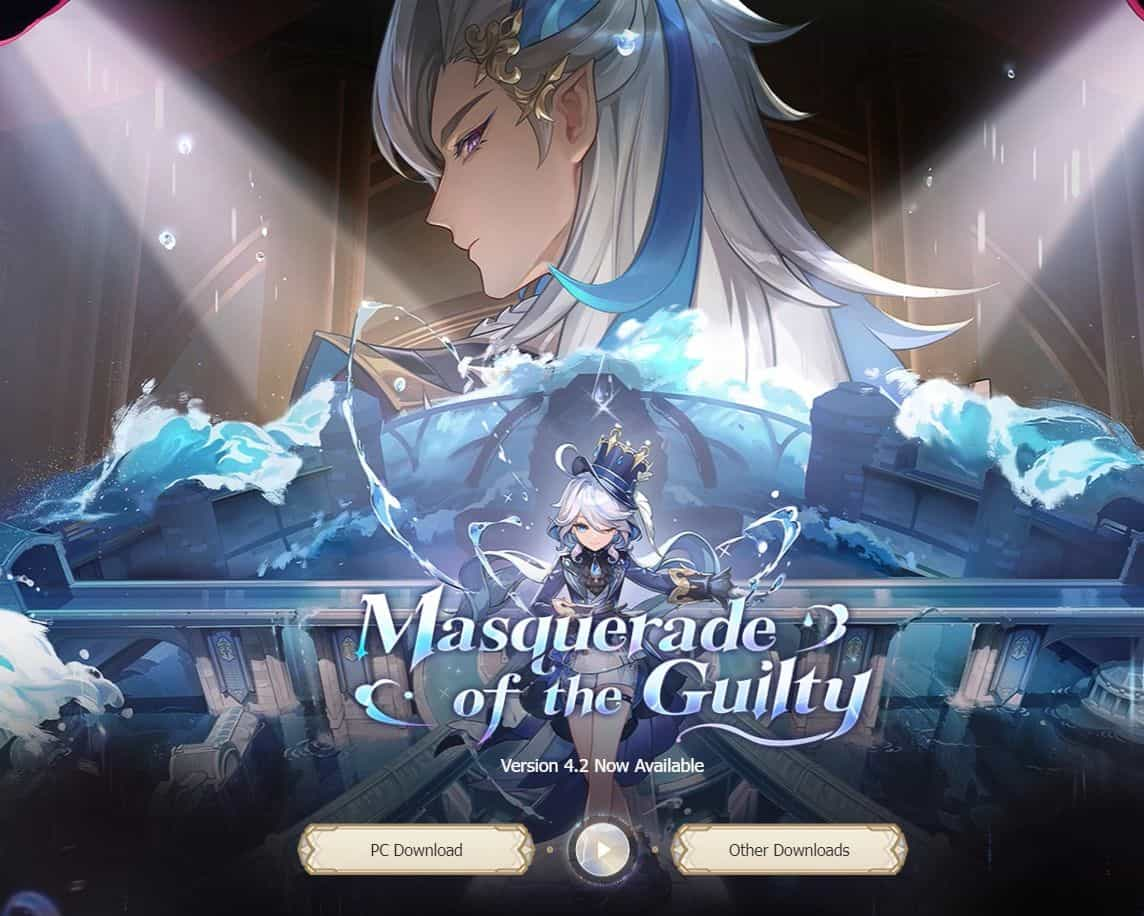
In addition, the US Federal Trade Commission fined Epic Games, maker of the hit battle royale game Fortnite, over $500 million in 2022, including $245 million for design tricks known as “dark patterns” aimed at getting consumers of all ages to make unintended in-game purchases.
Offering alternative avenues for earning in-game assets through skill and time investment reinforces the idea that a player's success is not solely determined by their financial contributions to the game. With the integration of in-game purchases and NFTs into gaming monetization models, developers must ensure that monetization strategies enhance rather than compromise the gaming experience.
Playa3ull vs. Competitors
A comparative analysis is essential to understand a company's relative strengths and weaknesses. So, let's explore!
Web3games
Built on the Polygon network, Web3games integrates the zkEVM scaling solution that promises instantaneous trading, unparalleled scalability, and negligible gas fees for minting, trading, and transfers. As a reminder, Playa3ull is built on Avalanche.
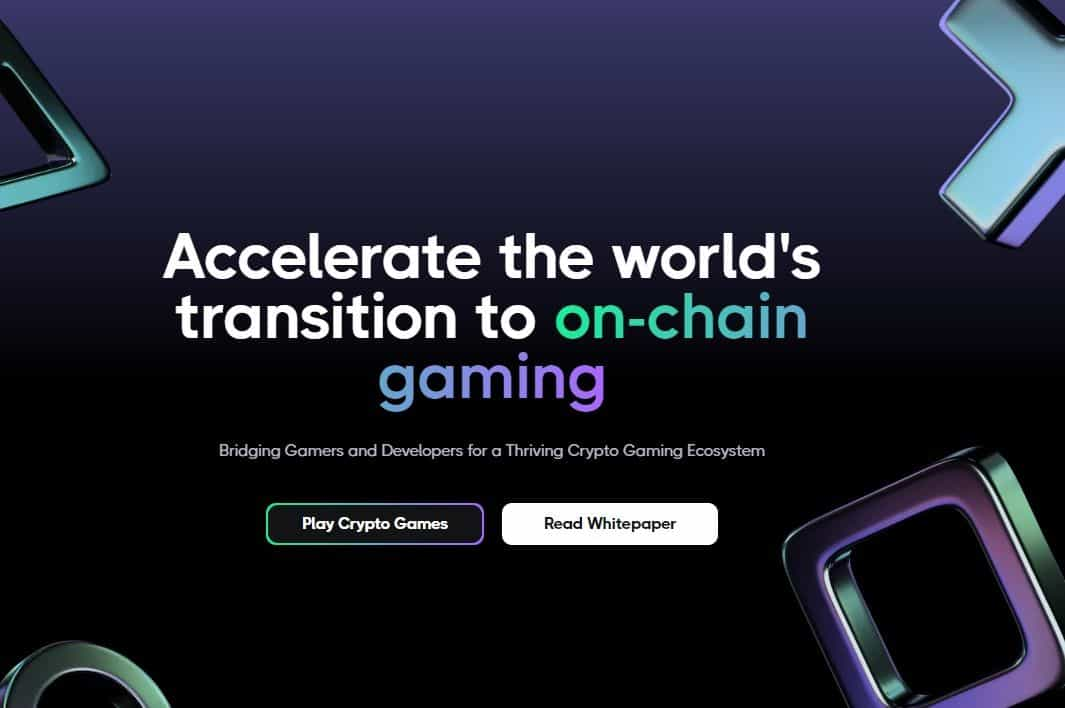
Web3games currently has three playable games, compared to one at Playa3ull. However, Playa3ull's sole offering — Nexus — is built on blockchain technology but doesn't have any crypto angle to it. By comparison, Web3games's three games aren't as advanced as Playa3ull's Nexus. They include a Texas Hold'em game, a match-3 strategy battle game and an NFT rhythm game.
In December 2023, Web3games expects to roll out the W3G token as well as the ability to stake it to earn rewards from protocol fees and development toolkit payments. While you can stake Playa3ull's token, it's used as an entry fee to a weekly competition.
Looking ahead, the Web3Games.com chain network is expected to launch in 2024.
Gala Games
The “games” in Gala Games may lead you to believe that the company only operates in the Web3 gaming space. That's not the case, however.
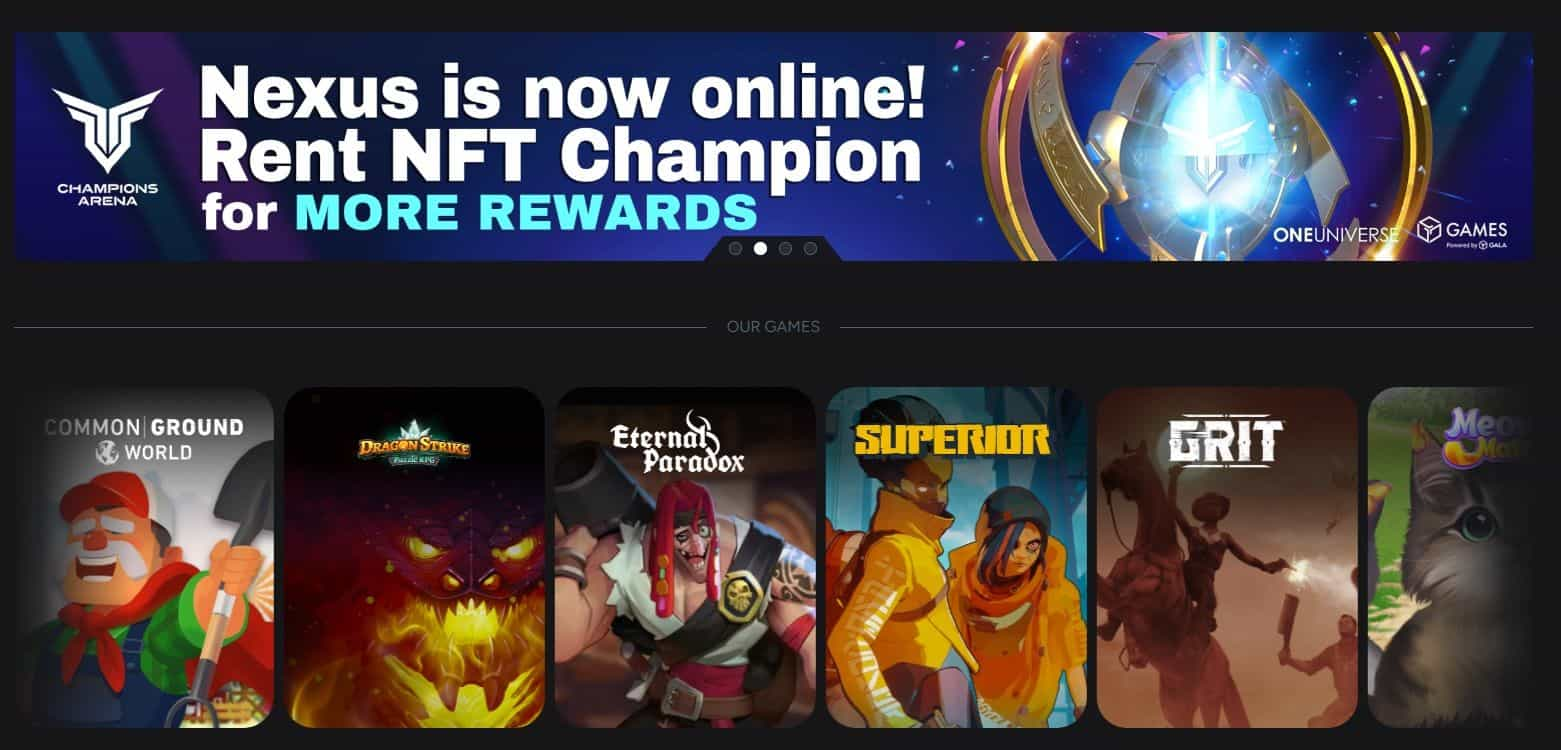
Gala Games also happens to be in the film and music verticals, but this is a gaming-focused article so that's what we'll focus on here.
Unfortunately, Gala seems to employ some of the same predatory monetization practices that are keeping Web2 gamers on the sidelines. In a game called Eternal Paradox, the game world resets every 49 days and you lose everything! Your majestic empire? Poof, gone. The hard-earned treasures? Sayonara. It's a reset party, and everyone's invited to start from square one.
Unless, of course, you pony up cash for a “sweet feature” (their words, not mine) for Immortal Stats. This means your owned character (regardless of rarity or level) will always retain their stat boosts when the game servers reset. Who needs progress anyway, right? Oh, and there are Gala's version of loot boxes too, and the chance to pull the best reward is 2%. Gala recommends that you increase your chances by stacking.
It's heartening to see Playa3ull is taking a more “gamer-first” approach.
The Future of Playa3ull Games
Playa3ull has outlined a detailed roadmap about what the future holds for the company.

In the fourth quarter of 2023, which runs from October to December, Playa3ull aims to put its marketing efforts into high gear. The period is also expected to see the releases of Starvin Martian and Ordinem. In addition, Nexus, its sole game thus far, should receive an update, as should the Playa3ull whitepaper.
In 2024, two more games — War of Steel and Dogs of War — as well as Playa3ull's metaverse are due for launch. Beyond that, the company is aiming to release three games each year until it reaches its target of 30 games by 2031, 10 years after its launch.
Will Crypto Games Reach Mass Adoption?
Despite facing challenges like complex onboarding, lacklustre gameplay, security concerns, and limited earning potential, the crypto gaming industry's future success hinges on prioritizing immersive storytelling, fair monetization models and user-friendliness.
Traditional gaming studios, well-versed in diverse expertise, can contribute significantly. Simplifying blockchain technology behind the scenes is key, ensuring players can seamlessly enjoy the immersive and enjoyable adventures that define gaming without unnecessary complications. While challenges persist, the promising potential of crypto gaming lies in prioritizing user experience and eliminating unnecessary hurdles.
Playa3ull seems to understand this better than some of the competition and appears to be on the right track of creating an immersive, community-driven and player-first platform.
To read more, head over to our article where we examine the challenges that have hindered crypto games' progress.
Playa3ull Games Review: Closing Thoughts
Playa3ull's commitment to player involvement through DAOs, ownership of in-game assets via blockchain technology, and the introduction of its native cryptocurrency, 3ULL Coin, reflects a forward-thinking approach that blockchain is the next evolution of gaming. By incorporating the metaverse concept and allowing players to purchase virtual land, Playa3ull is essentially tapping into the economic opportunities within these virtual worlds, while simultaneously creating engaging and entertaining crypto games that focus on gameplay.
The company's unique methodology of designing games backwards, with active community involvement in decision-making processes, sets it apart from traditional gaming approaches. The emphasis on fair monetization models and the avoidance of pay-to-win mechanics in its sole game aligns with the growing demand for ethical and transparent gaming practices.
As Playa3ull Games progresses into the future, its roadmap outlines ambitious plans for further game releases, including the metaverse launch in 2024. The company's dedication to releasing three games per year until 2031 demonstrates a long-term commitment to sustained growth and innovation.
However, the platform faces challenges typical of the crypto gaming industry, including competition, potential regulatory uncertainties, and the need to balance community input in decision-making. The success of Playa3ull Games will depend on its ability to navigate these challenges effectively, deliver on its promises, and capitalize on the increasing interest in blockchain gaming.
Disclaimer: This is a paid review, yet the opinions and viewpoints expressed by the writer are their own and were not influenced by the project team. The inclusion of this content on the Coin Bureau platform should not be interpreted as an endorsement or recommendation of the project or product being discussed. The Coin Bureau assumes no responsibility for any actions taken by readers based on the information provided within this article.
Frequently Asked Questions
The blockchain gaming market is plagued with pay-to-win and play-to-earn elements that prioritize income generation and monetization strategies over gameplay. Playa3ull's Nexus game doesn't have such issues. You can level up by simply grinding.
- You can purchase a Master Node Network, which serves as a vital element for decentralized blockchain indexing, querying, and IPFS storage. It's currently going for $5,500.
- Then there's VI3, an exclusive club that requires an investment of 10,000 3ULL ($762.8 currently).
The easiest way, however, is to just play their games.
Playa3ull's Discord is its largest community where like-minded individuals converge, bonded by a common passion for blockchain gaming. In addition to Discord, the company also has a presence on Facebook, YouTube, Tikok, X (formerly Twitter) and LinkedIn.
Disclaimer: These are the writer’s opinions and should not be considered investment advice. Readers should do their own research.


